vivo today held this year’s Special Event of the 2023 vivo Imaging Conference in Xining, China, where it showcased a host of innovations in imaging technology. The company unveiled the V3 chip, a state-of-the-art 6nm customized V3 chip, as well as the latest algorithm technology. In addition, vivo revealed a periscope lens with the new “Vario-Apo-Sonnar” standards developed in partnership with ZEISS. During the event, vivo also announced the winners of the 2023 VISION+ Mobile PhotoAwards, with Indonesia photographer Jiehan Herry Saputro’s “Let Me Fly” crowned the Best Photograph of the Year.
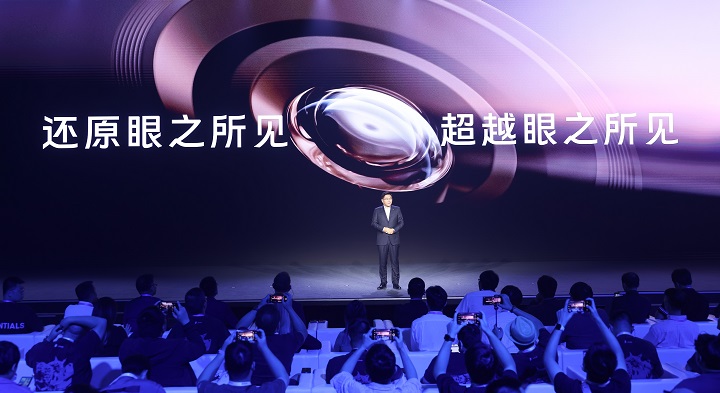
Yu Meng, Vice President of vivo Imaging; Li Zhuo, Senior Director of vivo Imaging Products; Sebastian Döntgen, Head of Category Management, Marketing and Sales, ZEISS Consumer Products; Zhang Yan, Product Manager of vivo Imaging Performance; visual artists Gao Yuan and Duan Yueheng; Song Wen, Founder of FIRST International Film Festival; and Bertram Hönlinger, ZEISS Expert of Photography, attended the event to share their views on technological innovation and the future of mobile imaging.
“At vivo, we are committed to advancing ‘human-centric professional imaging’. To this end, we continuously enhance our expertise across optics, computing, and algorithm foundations to build imaging capabilities comparable to professional photography equipment. We aim to deliver the user experience of recreating what the human eye can see and make professional-grade imaging capabilities more accessible for everyone. In the future, vivo will stay committed to creating the best imaging technology and help users record life’s most precious moments,” said Mr. Yu Meng.
At a time when everyone can be a creator, vivo has been dedicated to providing exceptional user experience with innovative mobile imaging technology. From industry-outstanding imaging chips and algorithms to expanding technological boundaries in partnership with other industry leaders, vivo continues to make efforts to boost its image technology strengths and improve the user experience in any scenario.
Unveiling the latest V3 chip and algorithm technology
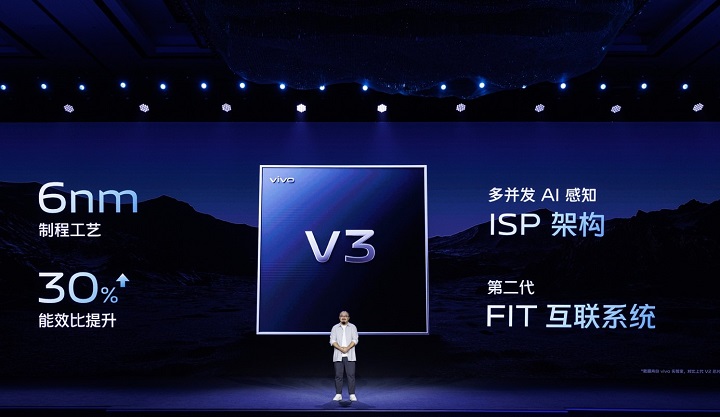
The brand’s latest V3 chip adopts a 6nm process and incorporates a newly designed multi-concurrent AI-ISP architecture and second-generation Frame Info Tunneling (FIT) technology. The technology upgrade delivers a superior user experience by enabling 4K cinema-like bokeh, automatic subject focus detection and switching, cinema-like skin optimization, and cinematic color processing. This makes vivo the first Android phone maker to enable 4K cinema-quality portrait video with post-processing functions.
In addition to the launch of the new V3 chip, vivo has also announced a composite algorithm matrix solution. The company’s new vivo Origin Imaging Engine (VOIE) enhances image quality, color, tone, and computing functionality by advancing the underlying algorithmic capabilities for three sub-modules: Color Restoration Engine, Ultra HD Engine, and Accelerated Computing Engine. vivo also developed the Hyper-Sense Portrait System and Vast-Sky Night System based on the common portrait and night scene user scenarios. Additionally, vivo has been continuously upgrading its algorithmic matrix and technological capabilities to ensure the best possible shooting experience in various scenarios.
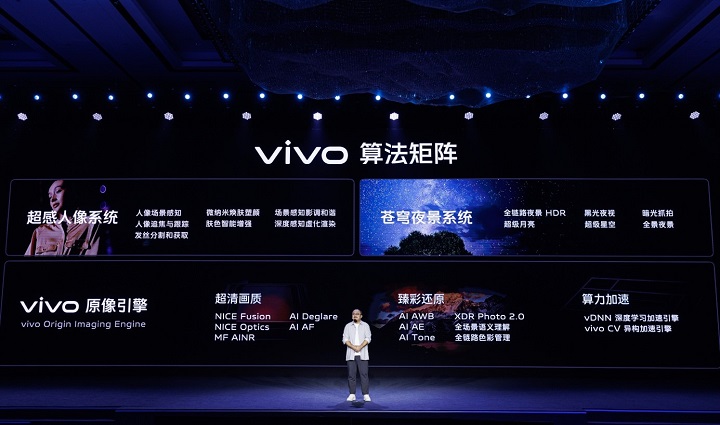
Building a prosperous image ecosystem with joint innovation
vivo’s long-term partnership with optical pioneer ZEISS has led to breakthrough innovations for X series, from generation to generation proving ZEISS technologies and iconic optical designs were adapted for vivo’s flagships. ZEISS T* coating for superior optical quality and iconic ZEISS Style Portrait to name just a few.
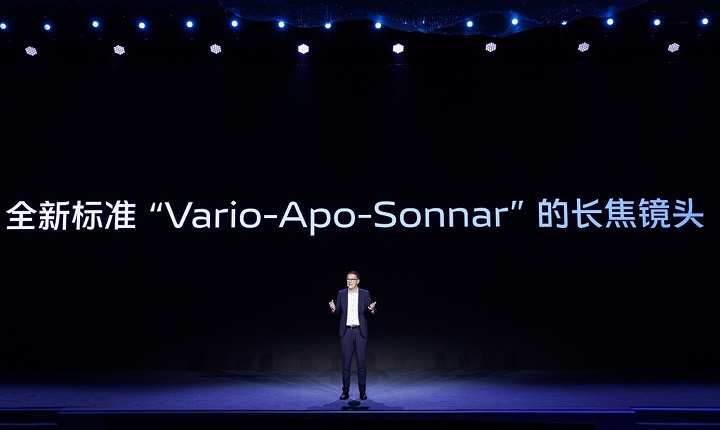
At the event, vivo and ZEISS jointly announced a periscope lens design with the new “Vario-Apo-Sonnar” standards. APO design is considered to have the level of the industry’s top-quality control of chromatic aberration. For the very first time, the APO design will be adapted to a mobile imaging system enhancing a high performance zoom quality.
Further leveraging the floating lens group technology in the periscope lens, aiming to provide ultra-high resolution and enhanced focusing capability, to enable users to achieve excellent macro shooting outcomes. At the same time, it also has a creamy bokeh effect that allows the subject to be further emphasized.
The T* Coating is ZEISS’s signature technology for anti-reflective coating on optical surface. The co-engineered rear camera system in the vivo’s X series has achieved compliance with ZEISS T* Coating and reduced significantly unwanted lens flares in images under challenging lighting conditions such as nighttime, strong backlighting, and complex light sources.
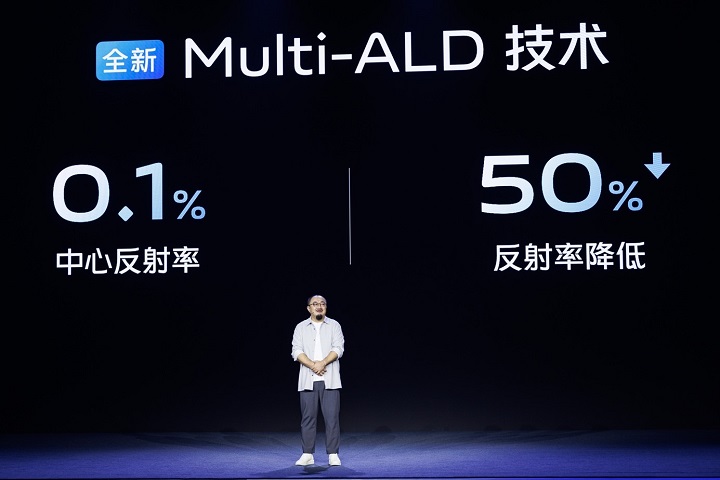
For vivo’s upcoming X series flagship model, ZEISS T* Coating will be equipped with Multi-ALD technology to enhance further the image clarity, by reducing center reflectivity from 0.2% to 0.1% on the visible light spectrum. Compared with the previous generation of ALC coating, the reflectivity will be reduced by 50%.
In addition to product innovation and joint development, being user-oriented is in vivo’s and ZEISS’ joint belief. vivo is committed to further diversifying the cooperation with ZEISS, including co-organizing the 2023 VISION+ Mobile PhotoAwards.
Sebastian Döntgen, Head of Category Management, Marketing and Sales, ZEISS Consumer Products said: “At ZEISS, we have photography in our DNA. To invite and enable even more users worldwide to enjoy creativity through cutting-edge smartphone image technology, it was a logical step for us to co-organize the 2023 VISION+ Mobile PhotoAwards with vivo. The impressive results that we were able to experience again this year are a great acknowledgment of our partnership on imaging aspects.”
vivo has announced a deep collaboration with MediaTek for its X80 series. Additionally, vivo plans to team up with Sony for further collaboration on technologies such as 2-layer pixel (stack pixel) and HDR in the future. vivo will also actively expand joint innovation research by collaborating with more industry partners, and with educational institutes such as ETH Zurich and other universities, striving for technological breakthroughs and a more diversified and open mobile imaging ecosystem.
Creating professional portraits and the ultimate night scene experiences
vivo has formed a unique portrait style that blends clear texture, natural skin tones, and a balance of real and virtual effects across device iterations. In addition, the brand continues to research and develop 3D portrait technology with 3D facial reconstruction and virtual content.
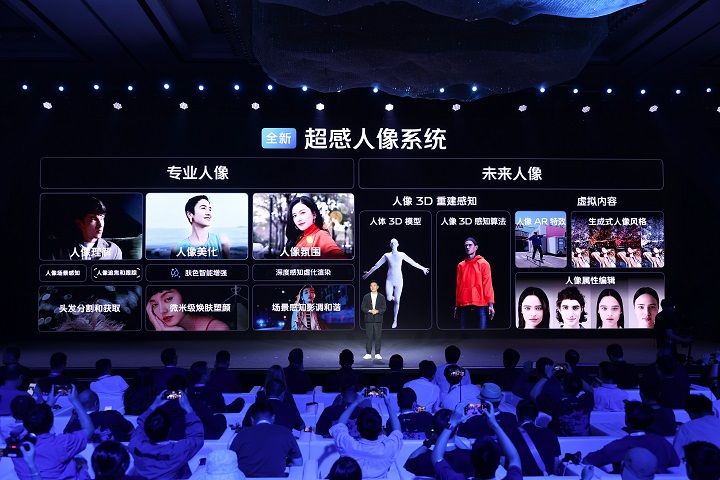
To this end, vivo has relied on its imaging laboratory platform to establish a 3D image laboratory with a proprietary cinema-like optical field system, capable of reconstructing extremely delicate 3D models of human faces and producing highly realistic visual effects in virtual environments. Based on experience gained from past products and real-life business scenarios, the company’s 3D models achieve precise facial expressions, body postures and gestures.
These technologies have been developed with three user scenarios in mind: generative portrait style, generative portrait editing, and various portrait special effects. Users will be able to take photos that perfectly balance real and virtual effects, edit photos powered by texture reconstruction and lighting estimation algorithms and freely change the lighting, hair and facial expressions.
vivo has introduced enhancements to its technical capabilities in image quality, tone, and color for landscape shooting. The upgraded Vast-Sky Night System was designed to improve image quality and supply the most advanced quality solution for night scenes at all focal lengths. The upgraded SuperRAW technology offers exclusive parameter adjustment capabilities, meeting any professional imaging requirements for all focal lengths.
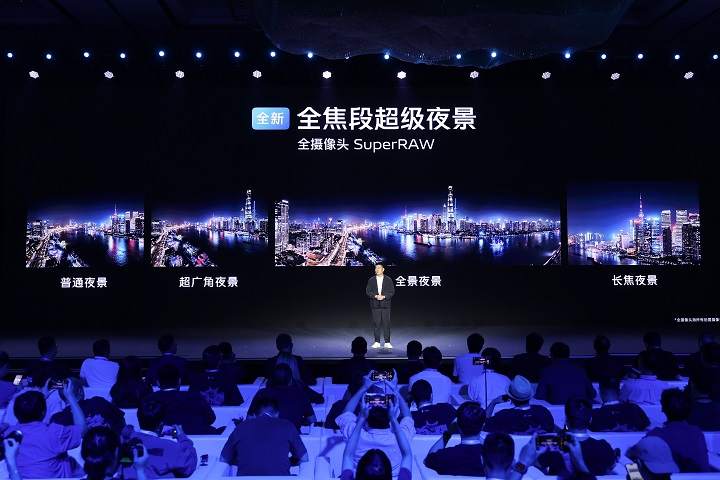
Based on VOIE, vivo has also introduced a True Color Night model powered by AI learning to the Night Sky Imaging System. This enhancement enables adaptive tone and color adjustments for night scenes and for night scenes with high contrast, a comprehensive night HDR solution has been introduced to tackle viewing issues in preview, shooting and display modes. In addition, the new XDR Photo 2.0 adds a highlight color preservation mechanism for light sources with high dynamic range and saturation at night. This improves the overexposure for highlights without affecting the color performance of the light source and preserves the night scene.
In the future, vivo will work together with Adobe, Apple, and Google to improve HDR photo standardization and overcome the inconsistent display of HDR photos on different devices—making vivo the only Chinese company involved in the development of the IOS standards for HDR photos.
On top of vivo’s original distinctive colors and ZEISS Natural Color, vivo’s team has launched a series of rich and personalized colors, drawing inspiration from classic photography techniques, classic films, and masterworks.
2023 vivo VISION+ Mobile PhotoAwards Winners
During this year’s Special Event at the Imaging Conference, vivo also announced the winners of this year’s VISION+ Mobile PhotoAwards. The top award went to Jiehan Herry Saputro ’s “Let Me Fly”, which is crowned the Best Photograph of the Year. In addition, the competition included awards in six categories: Portrait, Photo Series, Night, Landscape, Motion, and News. Two special awards were also announced: the X90 Series Best Photograph Award and the ZEISS Professional Imaging Award.

Since its inaugural launch in 2020, the VISION+ Mobile PhotoAwards program has received nearly one million submissions from over 40 countries and regions. This year, vivo received submissions from India, Malaysia, Indonesia, Myanmar, and many other countries and regions.

